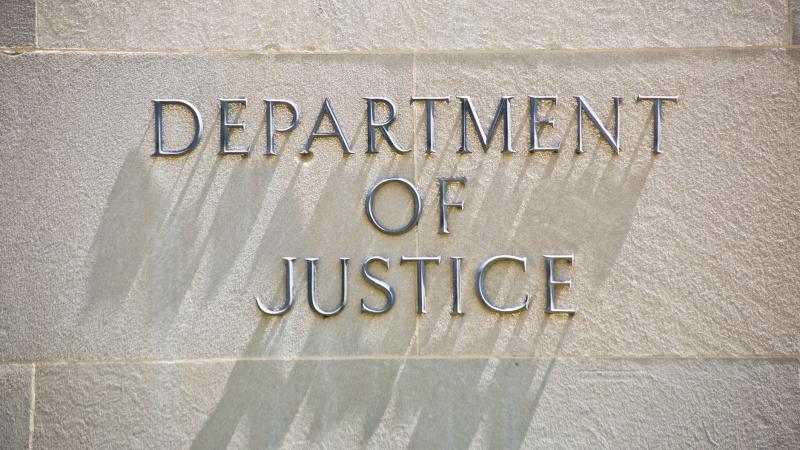Emails show Smith team tied to blocking Clinton campaign inquiry as DOJ builds grand conspiracy case
The Trump DOJ's grand conspiracy efforts likely aided by host of recently-unearthed revelations on Crossfire Hurricane, James Comey, Jack Smith and more.
Justice Department officials tied to special counsel Jack Smith’s team have been linked to the blocking of an FBI inquiry into the Clinton campaign’s 2016 funding of the Steele Dossier, with this being just the latest revelation about Smith as the Trump Justice Department builds a grand conspiracy case alleging years of anti-Trump lawfare.
Emails released Thursday appear to show the officials shut down a potential FBI investigation tied to possible campaign finance violations carried out by Hillary Clinton’s 2016 campaign when it used cutouts to fund the opposition research firm Fusion GPS and British ex-spy Christopher Steele’s anti-Trump dossier. Two officials tied to Smith’s anti-Trump investigation were linked to the decision by the FBI not to pursue the alleged campaign finance wrongdoing by Clinton’s campaign.
The decision by the Trump DOJ and FBI to open a probe that treats the last decade of political weaponization of law enforcement and intelligence agencies as an ongoing criminal conspiracy will likely be aided by the wave of recently-released information obtained by congressional investigators.
Just the News reported this summer that the FBI quietly launched an investigation into a decade of Democratic Party and "deep-state" efforts ranging from ginning up the Trump-Russia collusion to examining Smith's pursuit of Trump. The inquiry is allegedly looking into whether there was a criminal conspiracy to influence three consecutive presidential elections to the benefit of Democrats and the detriment of Trump.
Smith was appointed by Attorney General Merrick Garland to helm the Biden Justice Department’s investigations of former President Donald Trump. Recently-declassified revelations related to the Arctic Frost inquiry chronicle the expansive lawfare efforts against Trump and MAGA world, as criminal inquiries – which would soon lead to criminal charges – spun into high gear in 2022 as Trump leaned toward running for president again.
Years before Garland picked him to lead the Biden DOJ’s anti-Trump legal efforts, Smith had injected the Justice Department’s public integrity unit — which he led at the time — into what would become an IRS scandal involving Lois Lerner and the targeting of conservative non-profit groups.
Smith led the Public Integrity Section in the nation’s capital from 2010 until early 2015, leading a team of 30 prosecutors in conducting public corruption cases throughout the United States. Lerner, the director of the Exempt Organizations Unit of the IRS, in 2013 helped lead an agency effort targeting conservative Tea Party groups and other similar nonprofits.
Smith’s push for DOJ officials to reach out to Lerner and the IRS and for the DOJ to get involved seemed to be the impetus behind the IRS soon sending the FBI reams of U.S. nonprofit tax records, although the DOJ did not ultimately pursue prosecutions against the conservative groups.
Also appearing to tie many strands together is the bureau’s recent discovery of a host of secret investigative documents allegedly stashed in “burn bags” inside a classified space at FBI headquarters. The bureau said in court filings linked to its prosecution of fired FBI Director James Comey that “among the records found were many related to the FBI’s Mar-a-Lago search, the January 6 Capitol breach, the Crossfire Hurricane investigation and a copy of the Classified Appendix to the John Durham Special Counsel investigation.”
Just the News also recently revealed that more than two dozen Russiagate-related subpoenas are in the process of being sent out, coming at the same time that the DOJ’s false statements prosecution of Comey has resulted in the release of a host of new information about the fired FBI director as well as about the bureau’s secret stashing away of details on its investigations into Donald Trump.
Clinton campaign gets a pass thanks to DOJ officials later tied to Jack Smith
The Federal Election Commission ruled in 2022 there was “probable cause” to believe Hillary for America and the DNC violated federal laws by “misreporting the purpose of certain disbursements” and fined them.
The FEC said the DNC paid $849,407 and the Clinton campaign paid $175,000 to Perkins Coie for what was alleged in a complaint to be “opposition research done by Fusion.” The Clinton campaign reported the purpose of all those payments as “legal services” while the DNC reported the purpose of most of those payments as “legal and compliance consulting.”
Clinton campaign lawyer Marc Elias hired the opposition research firm Fusion GPS, which in turn hired Steele in 2016. Elias has testified he was aware of Fusion’s plans to have Steele brief reporters on his anti-Trump research during the 2016 contest, met with Steele during the 2016 contest and periodically briefed the campaign about the findings from Fusion and Steele.
Special Counsel John Durham said members of the Clinton campaign, Fusion GPS and Perkins Coie all played a coordinated role in pushing collusion claims and that Elias was part of the “joint venture” in 2016.
The FBI would pass on a criminal investigation into the campaign finance angle – and new records appear to show why.
Sen. Chuck Grassley, R-Iowa, said Thursday that “the decision to decline the investigation” into the Clinton campaign and the DNC was made by Richard Pilger, then a leader in the DOJ’s Public Integrity Section, and by J.P. Cooney, who was working at the time within the U.S. Attorney’s Office for the District of Columbia.
Grassley noted that Pilger “was later pivotal in reviewing and approving the opening of Smith’s Arctic Frost investigation” while Cooney “served as Smith’s Deputy Special Counsel for that investigation.” Pilger had previously been tied to Smith’s involvement with the Lerner saga years before.
The FBI Washington Field Office’s electronic communication about the aborted inquiry, dated July 2019 and made public Thursday, said the bureau was seeking a “prosecutorial consultation” from the U.S. attorney’s office in the nation’s capital and from the DOJ’s public integrity unit about “DNC and Fusion GPS FEC violations.”
The document made it clear that the FBI passed on this investigation in part due to input from Pilger and Cooney.
Subpoenas fly in investigation into Russiagate wrongdoing
A federal grand jury is in the process of issuing more than 30 subpoenas tied to the false claims of Trump-Russia collusion that were propagated by the U.S. intelligence community and federal law enforcement in 2016 and beyond, a source directly familiar with the matter told Just the News last week.
DOJ officials are also issuing grand jury subpoenas relating to an investigation into former CIA Director John Brennan tied to his handling of Steele’s discredited dossier and his involvement in the politicized intelligence community assessment on the 2016 election.
A grand jury has been empaneled in South Florida to handle investigations into the Russiagate saga, sources familiar with the inquiry told Just the News.
Just the News previously reported that CIA Director John Ratcliffe sent a criminal referral on Brennan to the FBI in July related to the intelligence community assessment on the 2016 election, with the CIA chief tweeting that “the 2016 IC Assessment was conducted through an atypical & corrupt process under the politically charged environments” under Brennan and fired FBI Director James Comey, who is currently being prosecuted for allegedly lying to Congress when he denied authorizing leaks to the media about the FBI’s Clinton investigation in 2016.
Director of National Intelligence Tulsi Gabbard also sent declassified evidence to the DOJ in July on what she dubbed a “treasonous conspiracy” related to top U.S. intelligence officials during the Obama administration allegedly politicizing intelligence related to Russia and the 2016 election, Just the News had also reported.
Brennan defended himself and denied any wrongdoing on MSNBC last month.
The subpoenas are being sent out as new revelations indicate that Comey expected Clinton to emerge victorious in 2016, that the ex-FBI director was aware of the so-called Clinton Plan intelligence wrongly linking Trump to Russia in that election, and that his friend and lawyer Daniel Richman allegedly leaked to the media despite FBI guidelines warning him not to.
Arctic Frost melts under scrutiny
Smith and the FBI reportedly collected the private phone records of eight Republican senators and one GOP House member as part of his investigation into the Capitol riot of January 6, 2021, sparked by the outcome of the 2020 election in which President Trump lost his first reelection bid.
An unearthed FBI record from 2023 indicated that investigators at the bureau had “conducted preliminary toll analysis on limited toll records” tied to phone calls related to GOP Sens. Ron Johnson, R-Wisc.; Lindsey Graham, R-S.C.; Bill Hagerty, R-Tenn.; Josh Hawley, R-Mo.; Dan Sullivan, R-Alaska; Tommy Tuberville, R-Ala.; Cynthia Lummis, R-Wyo.; Marsha Blackburn, R-Tenn.; and GOP Rep. Mike Kelly, R-Pa.
Lawyers for Smith defended their client's decision to obtain the phone records.
Smith issued nearly 200 subpoenas in his sweeping Arctic Frost-linked case against President Donald Trump related to the 2020 election and the events of January 6, 2021, seeking records on more than 400 Republican personalities and groups, according to records released by Grassley.
Recent evidence shows that Garland, then-FBI Director Chris Wray, and then-Deputy Attorney General Lisa Monaco signed off on the launch of the Arctic Frost inquiry into Trump related to the Capitol riot.
Unearthed emails also show that the Biden White House Counsel’s Office coordinated with an FBI agent to hand over phones that had belonged to Trump and former Vice President Mike Pence.
Arctic Frost also targeted dozens of GOP officials and organizations, according to documents released earlier this year.
Lois Lerner scandal foreshadows Jack Smith’s politicized nature
An IRS watchdog and the DOJ both later admitted Lerner and the IRS had committed wrongdoing. Lerner would apologize for her actions, though she denied she was driven by a political agenda. Republicans had unsuccessfully sought a special counsel to investigate the Lerner scandal at the time — with Smith’s actions being cited as one of the reasons.
Rep. Jim Jordan, R-Ohio, and Rep. Darrell Issa, R-Calif., sought Smith’s testimony in May 2014, saying, “It is apparent that the Department’s leadership, including Public Integrity Section Chief Jack Smith, was closely involved in engaging with the IRS in wake of Citizens United and political pressure from prominent Democrats to address perceived problems with the decision.”
Smith testified late that month that he had spoken with the FBI about these nonprofit groups.
“I don't want to get into specific cases or even talks that we had about considering specific investigations even if those investigations were never opened. … I can tell you that we had a dialogue with the FBI. Never opened any investigations, Public Integrity [Unit] did not. But we did have a dialogue with them over time following this [October 2010 meeting with Ms. Lerner].”
Smith said that he considered “whether it made sense to open investigations” but that his unit ultimately “did not open any investigations as a result of those discussions.”
Smith also put together multiple meetings with his senior leadership that included Pilger, then-director of DOJ’s Election Crimes Branch, with one meeting describing DOJ as looking into a “possible 501 / campaign finance investigation.”
Jordan told then-Deputy Attorney General James Cole in July 2014 that he believed a special counsel was needed to investigate the IRS scandal, pointing to Smith’s role specifically.
“The fact that Richard Pilger and Jack Smith had interaction with Lois Lerner in 2010 and 2013, that you had a data base of 1.1 million pages of taxpayer information, donor (c)(4) information, you had it for four years, and some of that information was confidential — all that fact, all that cries out for a special prosecutor,” the congressman said at the time.
The GOP report noted “the IRS sent 21 disks containing 1.1 million pages of nonprofit tax-return information – including confidential taxpayer information – to the FBI in advance of this meeting” with Lerner.
Smith recommended that his unit meet with then-IRS Commissioner Sarah Ingram to discuss the feasibility of DOJ enforcement. Pilger expressed skepticism and told Smith, “It would be good to gear up some enforcement, but very challenging as criminal work in the near term unless there is coordination with campaigns. Absent coordination, the Department's way in is probably most directly through Tax Division.”
Despite these concerns, Smith pushed forward, and the following week Smith, Pilger, and DOJ officials met again to discuss a “Possible 501/Campaign Finance Investigation.” Pilger reached out to Ingram’s office in late September 2010 to set up a meeting with the IRS, and Ingram told her staff that ‘‘we have to do this’’ and asked Lerner to organize the meeting.
Pilger met with Lerner and other IRS officials to discuss the “evolving legal landscape” of campaign-finance law, saying the goal was to talk with Lerner about being “more vigilant to the opportunities from more crime in the . . . 501(c)(4) area.”
“On Monday, October 4, Lerner and Pilger spoke in preparation for Friday’s meeting,” the Senate Finance Committee, then led by since-deceased Sen. Orrin Hatch, R-Utah, revealed in a 2015 report.
“During the call, Lerner and Pilger discussed having the IRS provide the DOJ and the Federal Bureau of Investigation with 501(c)(4) filing data and inviting the FBI to attend the Friday meeting. On Friday, October 8, the IRS, DOJ and FBI held their first meeting to discuss political spending by 501(c)(4) organizations.”
“[Public Integrity Unit] attorneys expressed concern that certain section 501(c) organizations are actually political committees posing as if they are not subject to FEC law, and therefore may be subject to criminal liability. The attorneys mentioned several possible theories to bring criminal charges under FEC law,” a summary of the meeting revealed, hinting at a possible partnership between the DOJ, FEC and IRS.
“Lerner explained the tax law surrounding 501(c)(4)s and challenges to criminally prosecuting these organizations,” the Senate report said. “The IRS also provided the DOJ with a series of documents regarding political activity of 501(c)(4)s.”
Pilger asked for a contact from the IRS a few weeks later so the Smith-led unit could further discuss “criminal tax enforcement against tax exempt organizations” with the IRS, and IRS official Nancy Marks provided Pilger with the requested contact but noted the very unusual nature of DOJ's inquiry and warned that the IRS had not “seen activity that rises to the level of criminal investigation.”
“Apparently, the DOJ's overly zealous attempts to criminally prosecute tax-exempt groups were enough to make even the IRS uncomfortable,” the Hatch report said.
The Facts Inside Our Reporter's Notebook
Links
- revealed
- ongoing criminal conspiracy
- reported
- revelations
- Arctic Frost
- injected
- stashed in burn bags
- revealed
- ruled
- believe
- complaint
- met with
- pushing
- collusion claims
- new records
- said
- electronic communication
- issuing more than 30 subpoenas
- previously reported
- tweeting
- also reported
- defended himself
- expected
- aware
- leaked
- warning
- unearthed FBI record
- defended
- shows
- show
- targeted
- admitted
- apologize
- sought a special counsel
- sought
- testified
- told
- recommended
- revealed














